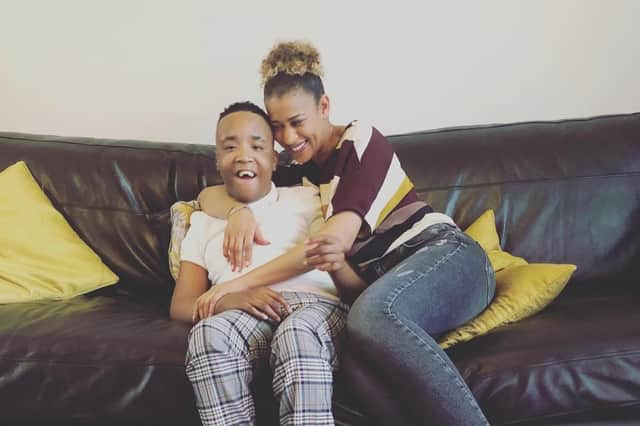‘Time has stood still’ for Sheffield parents since disabled son's death after ‘gross failings’ by hospital
and live on Freeview channel 276
Sheffield parents have paid tribute to their "beloved" son after an inquest found that "gross failings in care" contributed to his death.
Darnell Smith died at age 22 on November 23, 2022, 16 days after he was admitted to Royal Hallamshire Hospital in Sheffield. The young man had sickle cell disease and cerebral palsy, and he was non-verbal and completely dependent on others for his daily needs and medical care.
Advertisement
Hide AdAdvertisement
Hide AdHe was cared for at home by his mum Leila, aged 45, and 45-year-old dad, Errol. The family were supported by medical negligence lawyers at Irwin Mitchell through their son’s inquest.


At the inquest held earlier this month at Sheffield’s Medico-Legal Centre, senior coroner Tanyka Rawden issued a Prevention for Future Deaths report to Sheffield Teaching Hospitals NHS Foundation Trust, which runs the hospital, stating there was a "missed opportunity" to identify Darnell’s condition was deteriorating.
Darnell was taken to hospital at around 1am November 7, 2022, by his parents who suspected he was suffering a sickle cell crisis - a complication where the blood flow is blocked due to cells becoming stuck in a blood vessel – and a respiratory tract infection.
Around 12 hours after Darnell was admitted, his condition deteriorated and he was moved to the critical care unit and placed in an induced coma and put onto a ventilator. He also underwent a blood transfusion.
Advertisement
Hide AdAdvertisement
Hide AdDr Daniele Bryden, an intensive care consultant, told the court how Darnell "never got well enough to offer anything other than end of life care", and he passed away on November 23.
However, it was heard that on his admission to hospital, Darnell’s observations were carried out at 2.16am, and not repeated again until over 12 hours later. This was despite Darnell having an individualised care plan which set out observations should be conducted hourly for a minimum of six hours.
The inquest was told that Darnell’s health passport was not in his records and was not available to staff until more than eight-and-a-half hours after his admission.


Advertisement
Hide AdAdvertisement
Hide AdRecording a narrative conclusion, senior coroner Tanyka Rawden, told the court that Darnell’s observations being taken once in 12 hours amounted to "gross failings in care". She did not record a neglect finding as the coroner was unable to say whether Darnell’s death could have been prevented had appropriate observations been undertaken.
Ms Rawden said that despite a warning 'flag' being present on computerised records alerting staff to Darnell’s individualised care plan, it was hard to locate in the records, and was not considered during his admission.
She added that "individualised care plans are crucial to a patient's care and it is my view that without knowledge or sight of them by treating clinicians there is a real risk of further deaths."
'There is a real risk of further deaths'
An internal investigation report from Sheffield Teaching Hospitals Trust found that Darnell’s observations were only taken once in 12 hours due to "communication lapses" between staff members not knowing where to find his sickle cell care plan, and also between staff members and Darnell’s family, for which the Trust apologised.
Advertisement
Hide AdAdvertisement
Hide AdIt also identified "several opportunities" where communication could be improved. It recommended the implementation of a training package for sickle cell disease and a steering group for shared learning around complex patients.
After the hearing, parents Leila and Errol said: "To this day, we still can’t accept that Darnell’s not here anymore. He was our beloved boy and our lives were dedicated to looking after him. There’s not a day goes by when we don’t miss him.
"It feels like time has stood still since we lost Darnell, particularly because we had so many questions over what happened. The inquest has been really tough but at least we now have some answers.


"Sickle cell disease is a complex condition and we feel like there’s still not enough known about it and how to care for someone living with it, particularly those who also have learning difficulties like Darnell did.
Advertisement
Hide AdAdvertisement
Hide Ad"And while we know that nothing will ever bring Darnell back, we just hope that his death isn’t in vain and medical staff will endeavour to undertake the training required to help improve patient safety for those with sickle cell disease."
Dr Jennifer Hill, medical director, Sheffield Teaching Hospitals NHS Foundation Trust, said: "I would like to apologise again that we did not carry out Darnell’s observations as frequently as we should have done, and that his individualised care plan was not immediately visible to staff.
"I know that we cannot take away the pain that Darnell’s family are feeling, but I hope that I can reassure them that we have learnt from this and are taking actions to limit the chances of this happening again.
"We are implementing a new electronic patient care record system this year which will make all of our patients records more readily accessible for staff to take into account when delivering care."
Comment Guidelines
National World encourages reader discussion on our stories. User feedback, insights and back-and-forth exchanges add a rich layer of context to reporting. Please review our Community Guidelines before commenting.
